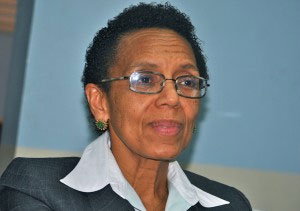 NASSAU, The Bahamas – The Homeowners Protection Bill 2017 is a “landmark” piece of legislation which aims to assist responsible homeowners who fell on “hard times” and need an opportunity to “readjust” and “regroup” said Senator the Hon. Allyson Maynard-Gibson, Attorney General and Minister of Legal Affairs.
NASSAU, The Bahamas – The Homeowners Protection Bill 2017 is a “landmark” piece of legislation which aims to assist responsible homeowners who fell on “hard times” and need an opportunity to “readjust” and “regroup” said Senator the Hon. Allyson Maynard-Gibson, Attorney General and Minister of Legal Affairs.
In her contribution in the Senate, Monday, March 27, 2017 she asserted that two Government initiatives, namely the Homeowners Protection Bill and the Mortgage Relief Programme provide the most “significant” intervention to promote and maintain homeownership “ever” in The Bahamas.
The Attorney General remarked that mortgage relief and the protection of homeowners were and remain a key plank in this administration’s platform.
“The Homeowners Protection Bill represents the legislative centerpiece of a comprehensive response to the Bahamian mortgage crisis, which was a direct result of the global financial crisis commencing in 2008.”
The interventions, she noted, have come from an administration whose Prime Minister continues to work 24/7 – 365 in the “best” interest of The Bahamas and Bahamians. “As it stands presently Banks and lending institutions are able to oust the Conveyancing Law of Property Act in the mortgage agreement. I think we all can agree that in this area playing field is not level between the lender and the homeowner, who simply wants to put a roof over his family’s head.
“This Bill applies to all mortgages where the dwelling home of the borrower is used as collateral for the loan. Families are protected under this Bill even where a loan was gotten for a business and the family home was used to secure the loan.
“We recognize and appreciate that not every element in this Bill will be popular with the Banks and lending institutions but we canvassed their opinions and concerns we were able to find middle ground on many issues,” the Attorney General said.
She outlined the following which must be included where a bank or lending institution exercises its power of sale through the courts or non-judicially:
- The nature of the breach of any covenant of the mortgage;
- The amount of arrears the mortgagor owes, if any, as well as all sums due under the mortgage;
- The amount of any administrative or other costs, including any property tax and insurance costs, necessarily incurred by the mortgagee and chargeable to the mortgagor;
- The actions the mortgagor must take by a stated time to cure the breach and avoid foreclosure and sale of the mortgaged property;
- The rights of the mortgagor under this Act including the right to apply to the Court for relief;
- The willingness of the mortgagee to discuss the breach with the mortgagor, with a view to entering into an agreement with the mortgagor regarding redress thereof, including modification of the mortgage terms if possible;
- Contact information for the mortgagee, including an address to which a mortgagor may come in person and a telephone number.
“This Bill may have taken longer than we anticipated but it was important to do proper research and see how other jurisdictions addressed this same problem. We are pleased that from now on all homeowners will have better protection under the law since this Bill applies to mortgages of dwelling homes entered into before or after the coming into force of this Bill as long as Court proceedings had not been started,” she said.
Highlights of the Bill as outlined by the Attorney General include the following:
- Banks must give specific notice before exercise of their power of sale
- Persons contributing to mortgage payments not just the mortgagor may approach the court for relief
- The court may make orders to vary the mortgage payments
- Banks are under a duty of fair dealing – directors or employees and their relatives may not purchase mortgaged property
- Under certain circumstances when the power of sale is exercised and the sale does not realize the principal and interest the mortgage may nevertheless be discharged
- Mortgagors may choose their own lawyers and surveyors and banks may not add the fee for another lawyer or surveyor to the mortgage
- Under certain circumstances transfers of mortgages are free of stamp duty
- Heavy penalties for violating the provisions of the Act
By Kathryn Campbell
Bahamas Information Services
